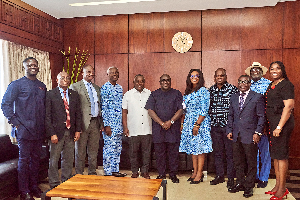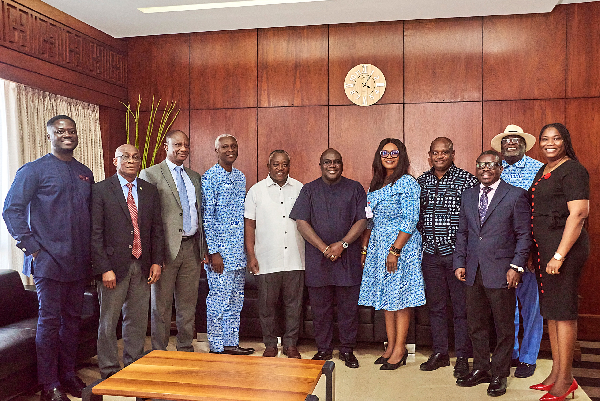 Members of the CIMG visit Chief of Staff, Julius Debrah
Members of the CIMG visit Chief of Staff, Julius Debrah
The President and Chairman of the Governing Council of the Chartered Institute of Marketing, Ghana (CIMG), Michael Abbiw, has reaffirmed the Institute’s commitment to partnering with the government to accelerate Ghana’s economic transformation through strategic marketing.
This pledge was made during a high-level engagement with the Chief of Staff, Julius Debrah, whose leadership continues to drive impactful partnerships across sectors.
He lauded the Chief of Staff for the successful execution of the Kwahu Business Forum, a platform that empowers indigenous businesses and promotes entrepreneurship.
Abbiw proposed that this initiative be replicated across all 16 regions, ultimately transforming it into a globally recognised platform for showcasing Ghanaian enterprise.
He also introduced two major research-led initiatives, the Regional Brand Index and the Consumer Survey Index, both designed to measure customer satisfaction and promote regional and national branding strategies.
These indices, according to Abbiw, would provide data-driven insights to inform policy and marketing strategies at the national level.
As part of the visit, the President of CIMG extended a formal invitation to the Chief of Staff to grace two upcoming flagship events, the African Marketing Confederation (AMC) Conference scheduled for August 20–22, 2025 at Labadi Beach Hotel, and the National Sales Leaders Conference (NSLC) to be held from August 19–21 at the Accra International Conference Centre.
In Response, the Chief of Staff, Julius Debrah, expressed appreciation to the CIMG’s proactive engagement to support the government initiatives.
He welcomed CIMG’s offer of collaboration and expressed the President’s willingness to support efforts that would position Ghana as a preferred conference destination within Africa.
On the issue of professional development, the Chief of Staff commended CIMG’s introduction of professional marketing qualifications, noting that localising the curriculum makes it more accessible and relevant for Ghanaian professionals.
According to him, this approach helps to reduce reliance on foreign exchange, making certification more accessible to a wider group of professionals. He welcomed CIMG’s involvement in the Brand Ghana Agenda and invited the Institute to submit a formal proposal on how it can support the government in that regard.
The Chief of Staff further endorsed the Regional Brand Index as a critical national tool and expressed interest in partnering with CIMG to roll out the 2025 edition.
He also encouraged the Institute to support the Accelerated Export Development Programme and announced that preparations were underway to organise Ghana trade fairs in some countries aimed at promoting Made-in-Ghana products.
He called for CIMG’s active involvement to help maximise the impact of these events.
He applauded CIMG for its introduction of locally contextualised professional marketing qualifications, describing them as a significant shift from foreign-based certification models.
The Presidential Advisor, Seth Terkper, provided additional strategic direction, urging CIMG to work closely with key ministries such as Trade, Agriculture, and Information, in addition to its supervising ministry, the Ministry of Education. He described the Institute’s role as cross-cutting and highlighted the importance of marketing to sectors that directly impact the economy.
He also reiterated the government’s commitment to making Accra a regional conference hub and encouraged CIMG to align its programs with that vision.
Terkper added that the Institute could design initiatives that harness the potential of marketing graduates, ensuring they are adequately prepared to contribute to national development immediately after completing school.
The engagement ended with the government tasking CIMG to address three major national challenges. The first is to develop a roadmap for transforming the Kwahu Business Forum into an international brand that attracts global participation.
The second is to propose a comprehensive strategy for advancing the Brand Ghana Agenda through CIMG’s independent professional expertise. The third is to design training programs for public sector officials and political appointees in areas such as communication, branding, and political marketing.
Abbiw expressed optimism about the future of the partnership and reaffirmed the Institute’s commitment to working closely with national leadership to build a resilient, inclusive economy.
He extended gratitude to the Chief of Staff, the President of the Republic, and all stakeholders working to create a better Ghana, adding that CIMG remains committed to contributing its quota to national development through professional marketing.
